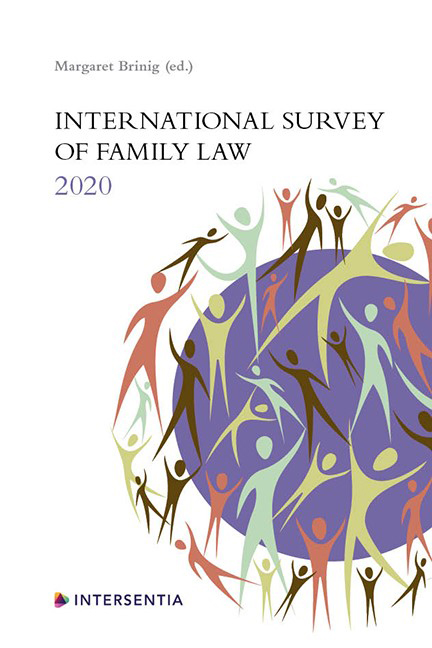Book contents
- Frontmatter
- Preface
- Contents
- List of Contributors
- Australia: The Search for Property in the Labyrinth of the Discretionary Trust
- Brazil: Intuitu Personae Adoption in the Brazilian Legal System
- Canada: Family Law at the Supreme Court of Canada
- China: Reform of the Marriage and Family Part of the Civil Code in China
- England and Wales: Beware of International Relationships
- European Court of Human Rights: Challenging Paternity under Case Law of the European Court of Human Rights
- France: A Chronicle of French Family Law: 2019
- Germany: Gender Identity, Sexual Orientation and Parentage: Family Law Lagging Behind
- Hong Kong: Hong Kong Family Law Today: Drowning not Waving?
- Korea: Full Guardianship in Korean Law: An Evaluation Over Seven Years from the Perspective of Family Court Practices and the Constitution
- Norway: The New Norwegian Adoption Act
- Poland: Discussion and Reform of Family Law in Poland
- Scotland: Making Scotland ‘The Best Place in the World to Grow Up’?
- Serbia: Child Maintenance and Welfare in Serbian Law
- Slovenia: New Regulation on Guardianship for Adults in Slovenia
- South Africa: Aspects of Dutch Colonial Family Law Related to the Indonesian Rajah of Tambora’s Exile at the Cape
- Sweden and California: On Children’s Rights to be Heard in Custody and Support Matters
- UN Committee on the Rights of the Child: Continued Reflections on Family Law Issues in the Jurisprudence of the CRC Committee: The Convention on the Rights of the Child @ 30
- Index
Scotland: Making Scotland ‘The Best Place in the World to Grow Up’?
Published online by Cambridge University Press: 09 February 2021
- Frontmatter
- Preface
- Contents
- List of Contributors
- Australia: The Search for Property in the Labyrinth of the Discretionary Trust
- Brazil: Intuitu Personae Adoption in the Brazilian Legal System
- Canada: Family Law at the Supreme Court of Canada
- China: Reform of the Marriage and Family Part of the Civil Code in China
- England and Wales: Beware of International Relationships
- European Court of Human Rights: Challenging Paternity under Case Law of the European Court of Human Rights
- France: A Chronicle of French Family Law: 2019
- Germany: Gender Identity, Sexual Orientation and Parentage: Family Law Lagging Behind
- Hong Kong: Hong Kong Family Law Today: Drowning not Waving?
- Korea: Full Guardianship in Korean Law: An Evaluation Over Seven Years from the Perspective of Family Court Practices and the Constitution
- Norway: The New Norwegian Adoption Act
- Poland: Discussion and Reform of Family Law in Poland
- Scotland: Making Scotland ‘The Best Place in the World to Grow Up’?
- Serbia: Child Maintenance and Welfare in Serbian Law
- Slovenia: New Regulation on Guardianship for Adults in Slovenia
- South Africa: Aspects of Dutch Colonial Family Law Related to the Indonesian Rajah of Tambora’s Exile at the Cape
- Sweden and California: On Children’s Rights to be Heard in Custody and Support Matters
- UN Committee on the Rights of the Child: Continued Reflections on Family Law Issues in the Jurisprudence of the CRC Committee: The Convention on the Rights of the Child @ 30
- Index
Summary
Résumé
Alors que Westminster était tourné vers le désolant spectacle du Brexit, le Parlement écossais a fait avancer son programme législatif. Celui-ci comprend d’importantes mesures relatives aux droits de l’enfant et de la famille. Le présent chapitre se concentre sur ce qui a été – et doit encore être – réalisé en matière de droit de l’enfant.
Deux réformes attendues de longue date ont finalement vu le jour. D’une part, la loi Ecossaise ne permettra plus aux parents de frapper leurs enfants. D’autre part, l’âge minimum de la responsabilité pénale a été porté à 12 ans.
La législation améliorant la loi sur les conflits intrafamiliaux relatifs aux enfants suit son cours dans le processus parlementaire écossais et s’accompagne d’initiatives visant à améliorer le fonctionnement de la loi dans la pratique.
Les travaux se poursuivent pour ce qui concerne la loi relative à la protection de
l’enfance et sur l’amélioration de l’expérience des enfants pris en charge par l’État. Le gouvernement écossais s’est engagé à assurer l’intégration de la Convention des Nations-Unies relative aux droits de l’enfant dans le droit écossais, si tant est que cela soit possible compte tenu de l’actuelle structure décentralisée par rapport au Royaume-Uni.
Le gouvernement écossais aime réaffirmer son ambition de faire de l’Ecosse « le meilleur endroit au monde pour grandir » et les réformes de la loi et de la pratique sont des éléments importants pour atteindre cet objectif. Toutefois, il devra faire beaucoup plus – notamment en s’attaquant au fait qu’un enfant sur quatre, vit dans la pauvreté – afin de pouvoir réaliser son ambition.
INTRODUCTION
Observers from abroad, who watched as the ‘Mother of Parliaments’ was mired in the unedifying spectacle surrounding Brexit, could be forgiven for thinking that legislative activity on other issues in the United Kingdom (UK) had ground to a halt over the last few years. Certainly, at Westminster, attention was focused on Brexit, leaving it less time to legislate for England and Wales or for the UK as a whole on other matters. Four hundred miles to the north, in the devolved Scottish Parliament, the picture was very different. While Brexit received attention, not least because the majority of the Scottish people had voted to remain in the European Union, the usual business of government continued. Bills on a wide range of matters, including child and family law, were introduced, considered in committee, debated and passed.
- Type
- Chapter
- Information
- International Survey of Family Law 20202020 Edition, pp. 215 - 238Publisher: IntersentiaPrint publication year: 2020



